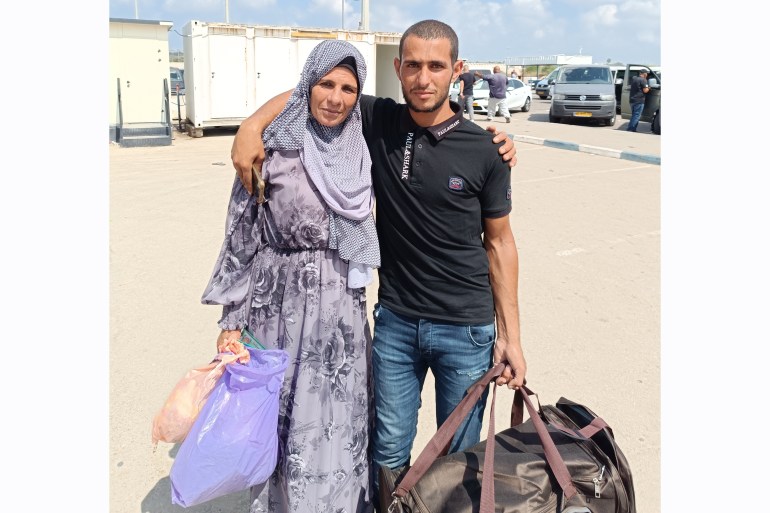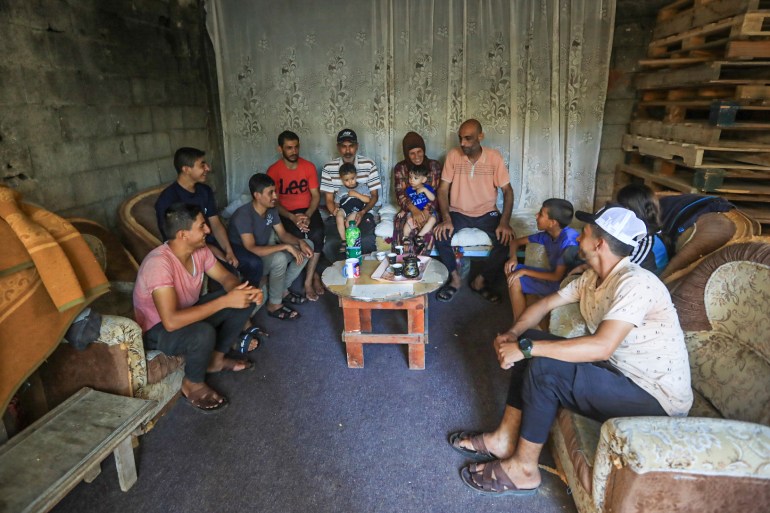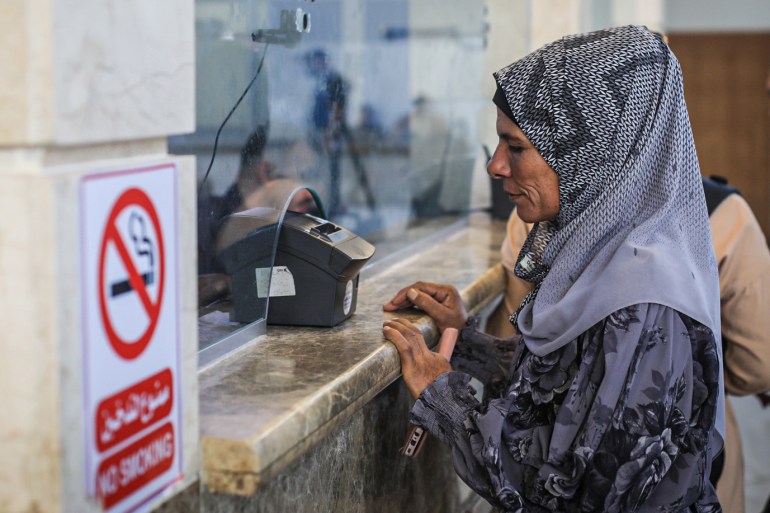Agzaya’s fight to return to her children in Israel
Palestinian Agzaya al-Karaan was deported to Gaza for the first time in 30 years three weeks ago.

Gaza Strip and Erez – Agzaya al-Karaan held her son Salameh in a tearful embrace moments after passing through the Beit Hanoun border crossing into Israel from Gaza. She was exhausted, worn out by worry and by her ordeal.
Three weeks ago, the 51-year-old was deported suddenly to the blockaded Gaza Strip after 32 years of living in Israel, leaving behind her 12 children, the youngest of whom is eight years old.
Keep reading
list of 3 itemsPalestinians flock to Gaza’s beaches to bid summer holidays farewell
Gaza fisherfolk can only ‘dream of fishing freely’ under Israel’s blockade
“If anyone loses their mother, every day that passes by is so difficult,” 22-year-old Salameh said in the Erez parking lot on Monday. “She was our life at home,” he added. “I’m happy. I can’t describe it. I missed her more than anything.”
Their life in the Bedouin community of Khashm Zanneh near the city of Bir Sheva could not be described as easy by anyone, but they were together, and Agzaya worked to keep it that way.
After her husband left the family several years ago, Agzaya worked even harder, taking care of her children any way she could.
For now, she is back home in Khashm Zanneh after the Israeli authorities backtracked on the deportation order following media attention to her story.

Taken
On Sunday night, Agzaya spoke to Al Jazeera from her brother’s home in Deir el-Balah in the Gaza Strip, detailing the ordeal that tore her away from her children.
Three years after moving from her birthplace of Gaza to Israel in 1990, she married a Palestinian citizen of Israel in a wedding that her family could not attend.
Her husband turned out to be abusive to her and to their children and then abandoned his family several years ago, leaving her to raise their children alone.
The work she was able to find was in the fields, growing vegetables to sell and support the family, and some of her children joined her as soon as they could.
At 3:30am on August 6, she was heading to work at her usual time, accompanied by her sons Osama, 20, and Tamer, 15, when she was stopped at a checkpoint and asked to present a valid ID, which she did not have.
Unable to understand the officer speaking to her in Hebrew, Agzaya relied on another woman in their car to translate. She tried to tell the officer that her husband had burned her documents so she couldn’t renew the temporary permit she had had for years. She tried to explain that she had 12 children she was the sole support for.

She was bundled into a police car, had her phone taken from her, and taken to a police station where she was questioned, in Hebrew, which added to her confusion and fright.
She kept asking to call her children but was refused until, hours later, she was told that she would be sent to Gaza, where she was born. Shocked and in tears, she pleaded to be allowed to contact a lawyer, or to call her younger children to say goodbye, to no avail.
Torn between two families
In Gaza, Agzaya went to stay with her brother and was reunited with the family she had not been able to see for 30 years, and who had never met her children.
“They rejoiced and welcomed me warmly, and many relatives came to see me,” she said. “It was an opportunity for me to see my family after a long absence, but at the same time, my heart is with my children.
“I have two married sons and two daughters now, and six grandchildren. My oldest child is 27 and the youngest is eight.
“They called me, told me the house is unbearable without me and they can’t eat or drink anything while I’m away, even my married children.
“My married children are looking after my little ones but I can’t leave them, no one can replace a mother. My little ones miss me so much and cry all the time because they are so attached to me.”

Agzaya’s brother Tamer Karaan, 43, said her children had filed a complaint against the policeman who deported her because he was supposed to give her time to bring her identity papers or to hire a lawyer.
This was not the first time Agzaya was stopped by the police in Israel, it had happened twice before.
“The first time, I told them I was married there and they checked the civil registry and found my name and the names of my children. The second time, I told them my husband had burned my papers. This time, when they didn’t find my name in the records they decided to deport me.”
A reprieve came after the Israeli newspaper Haaretz published a story on her ordeal last week and a social media backlash drew more attention to what was happening to Agzaya.
“After the Haaretz article, I got a call that said to come to the [Gaza-Israel] border [the next day],” Agzaya said. There, she was given a residency permit and told to go to the Israeli Ministry of Interior to sort her legal status out.
“I was so happy… I hugged my brother when he told me everything was fine and that I would go back to my children.”
It’s not much, but it’s home
Agzaya is hopeful things will work out and she will be able to settle back down to her simple life in the Negev Desert.

Nobody is allowed to build with brick or stone in the area where she lives, forcing her to build a rudimentary four-room home out of zinc sheeting that heats up unbearably in the summer desert heat.
The home has no electricity because even a solar panel and batteries cost more money than Agzaya is able to scrape together, and there is no municipal supply there, it is not allowed.
Palestinian Bedouin villages in the Negev are often unrecognised by the state and receive little assistance.
“Israelis tried to buy this land from us, but we refused, and they constantly harass us now,” she said.
There has also been a suspension of European Union aid to families like Agzaya’s, which stopped about seven years ago, she said.
Despite these issues, it is Agzaya’s home, where her children and grandchildren are.
“I just want to be happy with my sons and daughters,” she said. “That is the most important thing for me in the world. … I want to rebuild my house, so it has electricity like other people have… [I want] a happy, stable life.”
Legal status
In the decades since Agzaya’s marriage in Israel, laws towards “family reunification” have undergone several changes, making it more difficult for Palestinians to marry and live with spouses who hold Israeli citizenship within Israel.
Michal Luft, an Israeli lawyer who specialises in immigration law, explained to Al Jazeera that before 2003, “every Israeli citizen could apply for their spouse from any country in the world to live with them” and eventually claim citizenship.
However, that year, “Israel passed a law differentiating Palestinians” meaning they could be residents but could never be full citizens.
In 2008, Luft said, a new government decision removed the option of “family reunification” altogether for residents of the Gaza Strip, now no longer eligible for residency or citizenship in Israel.
When the decision was challenged before the Israeli Supreme Court, the court sided with the government, deciding that its policy was reasonable in light of “security concerns” and that the possibility for Israeli citizens to live with their spouse in Gaza fulfils Israeli legal commitments to support families.
Luft called the ruling a “shameful decision” while noting that some Gaza residents have managed to enter Israel on non-family-related permits and found ways to stay together.
Given that Agzaya no longer lives with her spouse, she may no longer be able to claim family reunification – which covers only spousal and not parental relations.
She could apply on a humanitarian basis to stay for her young children’s welfare, Luft said, but the process is lengthy and costly and most requests – especially involving Palestinians – are denied.